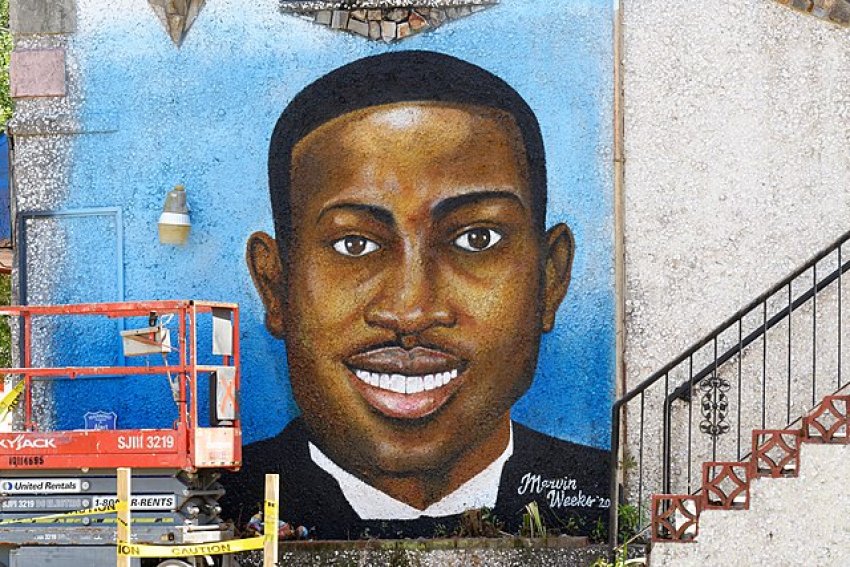
Black people in the United States felt a great sense of relief when a jury of eleven white people and one Black person voted to convict three white men on November 24 in Brunswick, Georgia.
They were found guilty of the murder of 25-year-old Black man Ahmaud Arbery, who was jogging in “their neighborhood” in February 2020.
The relief was because few expected a conviction.
Georgia is a deep southern state where lynchings were once a norm for Black people.
The first two prosecutors had refused to detain the men. It took mass protests led by the Black Lives Matters (BLM) movement and Arbery’s family to have them arrested.
Just a few days earlier, a white jury in Kenosha, Wisconsin, acquitted a white teenage killer, Kyle Rittenhouse, who shot and murdered two white supporters of racial justice and severely wounded a third white man.
The judge and far right called the protesters “rioters” and praised Rittenhouse.
Like others, I expected at best a hung jury in the Georgia trial. The convictions were unanimous on three felony counts for all three men, while only the shooter was convicted on all nine counts.
The men are Gregory McMichael, 65, his son Travis McMichael, 35, and their neighbor William "Roddie" Bryan, 52.
The case hinged on whether the defendants under a now-repealed Georgia law permitting citizen arrests had a right to confront the unarmed 25-year-old avid jogger last year on a claimed hunch he was fleeing a crime.
Defence lawyers argued self-defense centred upon a contested claim by Travis McMichael, who fired the fatal shots, that Arbery moments earlier had grabbed the pump-action shotgun that was used to kill him.
Killers’ false confidence
The men were so confident, one of them filmed and released the video that was critical to their own arrest and conviction. Their defense team racially targeted Arbery and at the trial said such things as Arbery had dirty toenails. They asked the judge to ban all Black ministers from the courthouse.
All three defendants, nevertheless, were convicted of murder, aggravated assault, false imprisonment, and criminal intent to commit a felony. They face a minimum sentence of life in prison, with the possibility of parole.
Defence lawyers said they will appeal.
President Joe Biden said the convictions showed the US criminal justice system was “doing its job,” though the killing was “a devastating reminder of how far we have to go in the fight for racial justice in this country.”
“Instead, we must recommit ourselves to building a future of unity and shared strength, where no one fears violence because of the colour of their skin,” Biden said in a statement.
Of course, that is not true.
The criminal justice system is rigged against Black people. So-called self-defense laws were created to allow whites to kill Black people like animals since the days of slavery without consequences. All a white person must say is, “I feared for my life” even if it was his own gun (the Kyle Rittenhouse defense).
It worked for George Zimmerman 10 years ago when he murdered Trayvon Martin walking in his own neighbourhood in Florida.
That was when the first protests began around the country which led to the creation of the BLM racial justice movement.
Big step forward
"Let the words go forth all over the world that a jury of 11 whites and one Black in the Deep South stood up in the courtroom and said that Black lives do matter," said Reverend Al Sharpton, speaking outside the courthouse minutes after the three men were convicted.
Sharpton is head of the National Action Network based in New York City. He said the convictions are a step forward in the criminal justice system and represent a turn for the better.
Sharpton has played a prominent role at many of the cases where Black people have been murdered by police and vigilantes since the rise of the BLM movement.
"Let it be clear that almost 10 years after Trayvon [Martin], God used Wanda and Marcus's son to prove that if we kept marching and kept fighting, we would make you hear us," Sharpton said, referring to Arbery’s mother and father.
"We've got a lot more battles to fight, but this was an important battle today."
Sharpton also lauded the people of Glynn County and other supporters from around the country who had been showing up since the beginning of jury selection more than five weeks ago.
“This has proven that our children know their value,” Sharpton said. “That's why those people that march, I'm talking about the people here, that were here when nobody else was here, they stood up. Brunswick, Georgia, will go down in history as the place that criminal justice took a different turn.”
Leading the crowd in prayer, Sharpton addressed the racial division that had underscored the case from the day of the shooting through to the verdicts being read.
“You came in the state of Georgia, a state known for segregation, a state known for Jim Crow, and you turned it around,” Sharpton prayed.
“You took a young, unarmed boy that they thought was worthless. And you put his name in history. Decades from now, they'll be talking about a boy named Ahmaud Arbery who taught this country what justice looks like.”
Sharpton also thanked “everyone in Brunswick that marched, that stood out in front of this courthouse, that was called a lynch mob, but they kept on marching”.
That is the key point. It took mass public protests to even get the three white killers arrested, tried and, finally, convicted.
It took ongoing protests at the courthouse and around Georgia and the country to achieve a modicum of justice for Arbery’s family.
Marching and protesting work. That is the lesson.